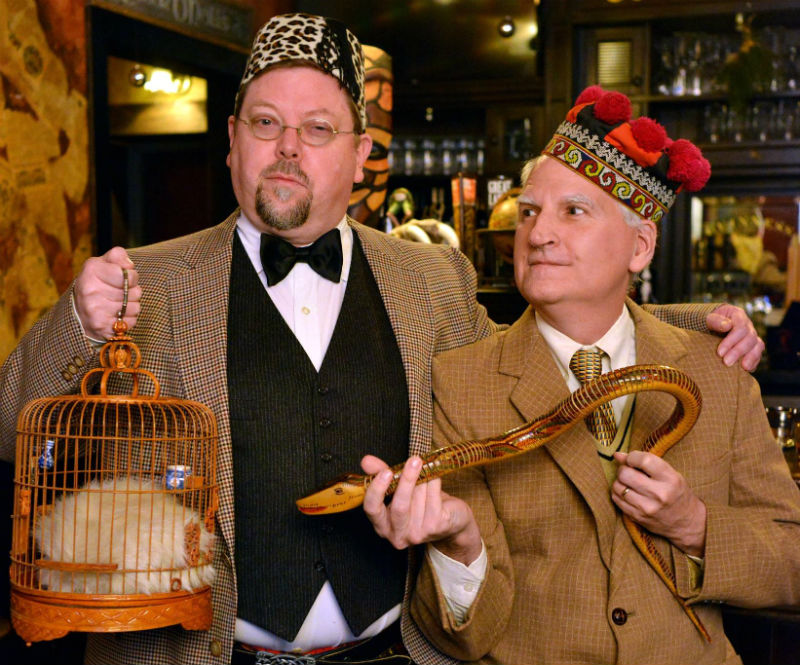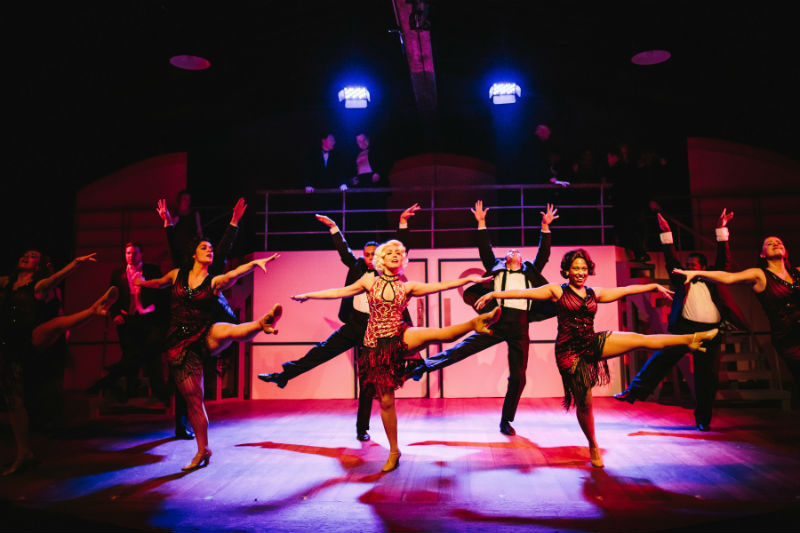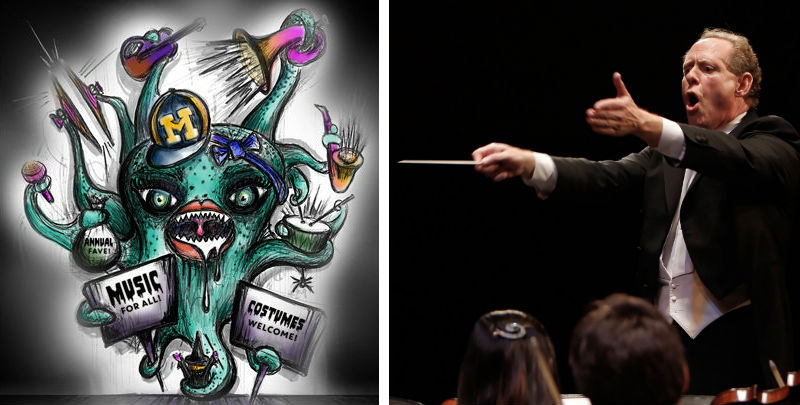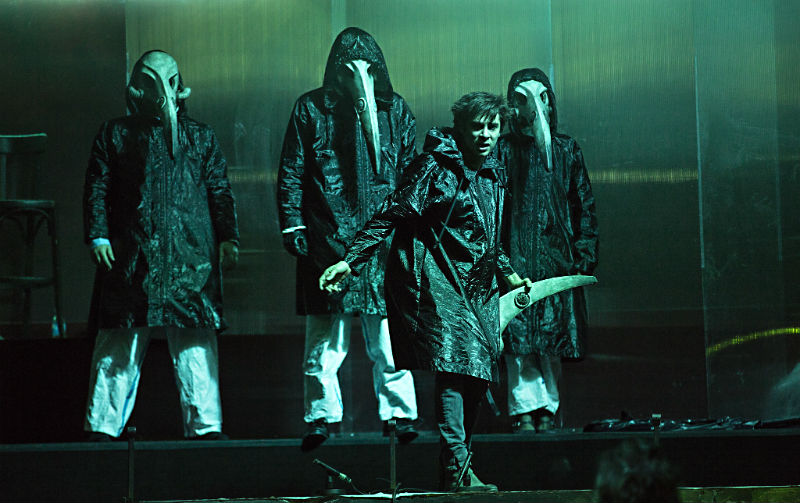Nervous Breakthrough: Ann Arbor novelist Camille Pagán's "Woman Last Seen in Her Thirties" explores loss & change

Ann Arbor-based novelist Camille Pagán (Forever Is the Worst Long Time, Life and Other Near Death Experiences) was in the midst of writing a book that wasn’t going anywhere when she had an unnerving grocery-store experience.
“This guy, a college kid ... bumped into me and didn’t even look at me or say anything,” said Pagán, who also noted that on other occasions while out shopping, she’d observed “when a cashier would talk to and make conversation with a middle-aged man but then not talk to the middle-aged woman who was next in line. This seemed to me to really be saying something about our society and how we view and treat women as they age.”
Encore Theatre's "School of Rock" rolls despite its difficulty

Taking a beloved hit movie and transforming it into a stage musical is standard practice these days. One look at current Broadway listings -- Aladdin, Anastasia, Frozen, the soon-to-open Mean Girls, and Waitress, to name a few -- proves how often the stage artists are borrowing from the screen.
But of course, not every translation works.
What made School of Rock -- the youth version of which is now being staged at Dexter’s Encore Theatre -- a bona fide hit (and a Tony Award nominee) instead of a B-side flop?
Pith Helmets & Pithy Plays: A2 Civic Theatre's “The Explorer's Club"

Once you learn that someone has an “adventure tiki room” in his own home -- well, let’s just say it’s not so surprising to learn this same person was inspired to direct an Ann Arbor Civic Theatre production of Nell Benjamin’s comedy The Explorers Club.
“(My adventure tiki room) is very empty right now,” said Brodie Brockie. “Pretty much everything is on the stage.”
The Arthur Miller Theatre’s stage, to be exact, where this weekend audiences will be transported to an exotic gathering spot for male adventurers in 1879 London. The Explorers Club, which had its Off-Broadway premiere in 2013, tells the story of what happens when a gutsy female explorer, Phyllida Spotte-Hume, crashes the club, with a non-English-speaking tribesman from a “lost city” in tow.
It's De-Lovely: "Anything Goes" at Encore Theatre

“Tap Your Troubles Away” isn’t one of the songs featured in the screwball musical comedy Anything Goes, but it’s nonetheless what popped into my head upon leaving Dexter’s Encore Theatre on Sunday.
Why? Because this silly confection of a Depression Era, vaudeville-infused musical, jam-packed with wordplay and witty Cole Porter tunes, offers a pleasurable, two and a half hour escape from our increasingly stressful world.
Originally staged in 1934, with a new book by Timothy Crouse and John Weidman (original book by P.G. Wodehouse and Guy Bolton, and Howard Lindsay and Russell Crouse), Anything Goes tells the story of Wall Street broker and ladies’ man Billy Crocker (Sebastian Gerstner), who stows away on his boss’ cruise liner upon spotting the woman he truly loves, heiress Hope Harcourt (Emily Hadick), on board with her British fiancee, Lord Evelyn Oakley (David Moan). Hope’s family suffered great losses during the Crash of ’29, so her engagement is more pragmatic than romantic, and her heart secretly belongs to Billy. Meanwhile, brassy nightclub singer Reno Sweeney (Olivia Hernandez) only has eyes for Billy, too, but over time, an unlikely friendship grows between her and Oakley.
Oh, and there’s a scheming, wisecracking gangster-in-hiding (Moonface Martin, played by Dan Morrison) and his moll (Erma, played by Elizabeth Jaffe) because isn’t there always? Some featured Porter songs in the show (besides the title number) include “I Get a Kick Out of You,” “You’re the Top,” “It’s De-Lovely,” and “Blow, Gabriel, Blow.”
The latter number is one of the production’s best and most extensive showcases for Rachel Constantino’s joyous choreography, the other being the first act's energizing closer, “Anything Goes” -- which, amazingly, winks at one of the biggest dance men of the show’s era, Busby Berkeley, in its patterns and formations, despite the Encore’s relatively tight space limitations.
But the big, splashy, “tap-gasm” (my term) numbers weren’t the production’s only highlights. “The Gypsy in Me” comes off as both hilarious and sexy, with Moan and Hernandez turning up the fizzy flirtation factor through Constantino’s cheekily sensual choreography; “Buddie, Beware” has Jaffe literally rolling in men; and in “Friendship,” Hernandez and Morrison break the fourth wall by acknowledging that they can’t keep musical director Tyler Driskill vamping forever while they neurotically commiserate and kvetch about various things.
These moments epitomize the Encore production’s polished, sophisticated breeziness, as established by director Thalia Schramm, who keeps the pace clicking without ever making the scenes feel rushed. Plus, Schramm subtly, wisely downplays the culturally cringey parts of the show -- namely the often-exaggerated depiction of a reformed Chinese gambler -- while still honoring the script. Now, how one man’s outfit comes to disguise two characters, well, that’s the kind of musical theater math you have to just roll with.

Driskill’s seven-person orchestra delivers Porter’s glamorous score with panache, and the ensemble sounds divine. Tyler Chinn’s lighting design helps bring out the romance and heat of certain numbers, while Kristen Gribbin’s versatile sets, paired with Anne Donevan’s props, help to visually transport us to the SS American while also allowing for seamless, quick transitions. Finally, Sharon Larkey Urick’s handsome costumes manage to be bewitchingly sexy without being tacky, with Hernandez sporting the production’s most gorgeous gowns.
But Urick’s dresses are only one reason it’s hard to pull your eyes from Hernandez whenever she’s on stage. The charismatic actress commands the stage with a winning charm, and her knockout vocals have an effortlessness that’s only achieved through hard work and discipline. Gerstner is a delightful, graceful, and appealing leading man, and Morrisson and Jaffe have a ball with their deliciously cartoonish supporting roles. One of the most impressive leaps, though, is achieved by Moan, who takes the stuffy straight man role and renders it hysterical by seizing upon every opportunity -- like Oakley’s fascination with American colloquialisms, for instance, or his penchant for dancing around in a short robe and sock garters (courtesy of Urick) -- to wring humor from the character, and thus make Oakley more interesting.
Of course, there’s no mistaking that Anything Goes is a show built around the music, not the other way around; and with its absurd plot, cornball humor, and broad characters, the musical is more about making audiences feel good for a couple of hours than it is about making them feel much of anything else.
But these days, I’ll happily take that.
Jenn McKee is a former staff arts reporter for The Ann Arbor News, where she primarily covered theater and film events, and also wrote general features and occasional articles on books and music.
"Anything Goes" runs through Dec. 23 at The Encore Theatre, 3126 Broad St., Dexter. Showtimes: Thursdays, Fridays, and Saturdays at 7:30 pm and Saturdays and Sundays at 2 pm. Visit theencoretheatre.org for tickets and more info.
Down by Law: David Wells' "Resisting" world premieres at Theatre Nova

“Resist” is not only a rallying cry of our political times; it was the seed of Ann Arbor-based playwright David Wells (“Irrational,” “Brill”) latest world premiere play at Theatre Nova.
Resisting, which runs Oct. 27-Nov. 19, grew out of a news story Wells read about what’s called “broken windows policing.” Born in New York City in the ‘90s, “It’s essentially a zero-tolerance approach, that was combined with ‘stop and frisk,’” said Wells. “(Broken Windows) started with a scholarly paper that suggested that ... if one window in a building is broken, and it’s not fixed immediately, all of them will be broken. ... So the police were compelled to start ticketing or arresting people for every little infraction, no matter how small -- whether it’s jumping a turnstile, or jaywalking, or spitting in public. This led to a more antagonistic relationship between the police and the citizens they were supposed to serve. And these policies also only seemed to be applied in low-income neighborhoods.”
Scary Rituals: U-M's Halloween concert has haunted for 4 decades

Sunday’s 40th annual Halloween concert at Hill Auditorium -- which combines the Campus Symphony Orchestra with the Campus Philharmonia Orchestra -- will mark conductor Kenneth Kiesler’s 23rd time on the podium while in costume. (What he’ll be dressed in this year is under wraps.)
But what you might not know is that he and the student musicians get one chance each year to raid the theater department’s costumes.
“They have a huge warehouse,” said Kiesler. “You could get just about anything you want.”
Cognitive Overload: NY Times' Charles Blow talked truth & Trump at Rackham

Reading a long list of sponsors doesn’t usually prompt a standing ovation; but because celebrated New York Times op-ed columnist Charles M. Blow couldn’t hear, while backstage at Rackham Auditorium on Friday evening, what was being said while waiting to make his entrance, he gamely emerged before his official introduction had even gotten underway.
Not that the adoring, full-capacity crowd minded the miscue in the least. Presenting the keynote speech of a Humility in the Age of Self-Promotion Colloquium at U-M, Blow spoke for 40 minutes on the topic of Trump, arrogance, and democracy, and answered audience questions for an additional half hour.
Mythological Duty: "Welcome to Night Vale" creators visit Ann Arbor

One article about the popular, fiercely beloved Welcome to Night Vale podcast begins with the line, “Unless you’ve been living under a rock, you’ve heard of” the show.
But until I’d received a copy of the novel It Devours! written by the podcast's creators, Joseph Fink and Jeffrey Cranor, and researched Night Vale in preparation for a recent phone interview with Cranor, I’d been one such under-the-rock dweller.
Yet because the podcast could be described as the David Lynch version of A Prairie Home Companion -- focusing on a fictional desert town in the American Southwest, where all conspiracy theories are true -- I asked Cranor if any of Night Vale’s residents also live under rocks.
“No, but one of the characters is a rock -- the dean of the Night Vale Community College, Sarah Sultan,” said Cranor without missing a beat, referring to a character who communicates via telepathy.
Well, then. At least I might have some company.
Joseph Fink and Jeffrey Cranor will be with artist and illustrator Jessica Hayworth at U-M's Lydia Mendelssohn Theatre on October 23 at 7 pm, courtesy of Literati Bookstore. The three will be interviewed by Detroit writer, actor, comedienne, and The Moth Storyslam Ann Arbor host Satori Shakoor, followed by an audience Q&A and signing.
Cranor answered questions for Pulp about Welcome to Night Vale and It Devours!.
Camus' leaden "L’Etat de siège" is a slog even for the great Théâtre de la Ville

I once spent a summer reading just about everything Albert Camus wrote. Not exactly beach reading, I know -- I jokingly referred to it as “my crazy summer” -- but I’d been hired to write the preface of a book about the French writer’s work, so I dove in.
I hadn’t counted Camus' seldom-produced 1948 play L’Etat de siège (State of Siege) among my favorites of his writings, but I was intrigued that Théâtre de la Ville was staging it. Having seen previous Théâtre de la Ville productions courtesy of University Musical Society (UMS), including Ionesco’s Rhinoceros in 2012 and Pirandello’s Six Characters in Search of an Author in 2014, I was hopeful the Parisian company's past lavish renderings of absurdist classics would nonetheless find a way make Siege sing.
And yes, Theatre de la Ville’s take on Siege at the Power Center on Friday and Saturday looked slick and offered some truly inspired moments of stagecraft, but Camus’ heavy-handed political allegory still ended up feeling pretty leaden.
All Wrapped Up: Christo at the Michigan Theater

On Thursday evening, world-renowned sculptor Christo, 82, told a huge crowd -- packed into the Michigan Theater to see him -- what might be the best, most succinct courtship story of all time.
Of his longtime partnership with Jeanne-Claude, with whom he collaborated on his massive art installations (and who died in 2009), Christo said, with a shrug, “I was very young, we make love, and we like each other. That’s all.” Moments later, he added, “She was very pretty.”
But Christo -- dressed in dark slacks, a collared white shirt, and a big-pocketed beige jacket that hung off his lean frame -- initially kicked off his Penny Stamps Speaker Series lecture with a few parameters: “I will answer all questions, but I will not talk about politics, religion, and certainly not about other artists. I talk about myself, my work, and anything that I can tell you about my work.”


































